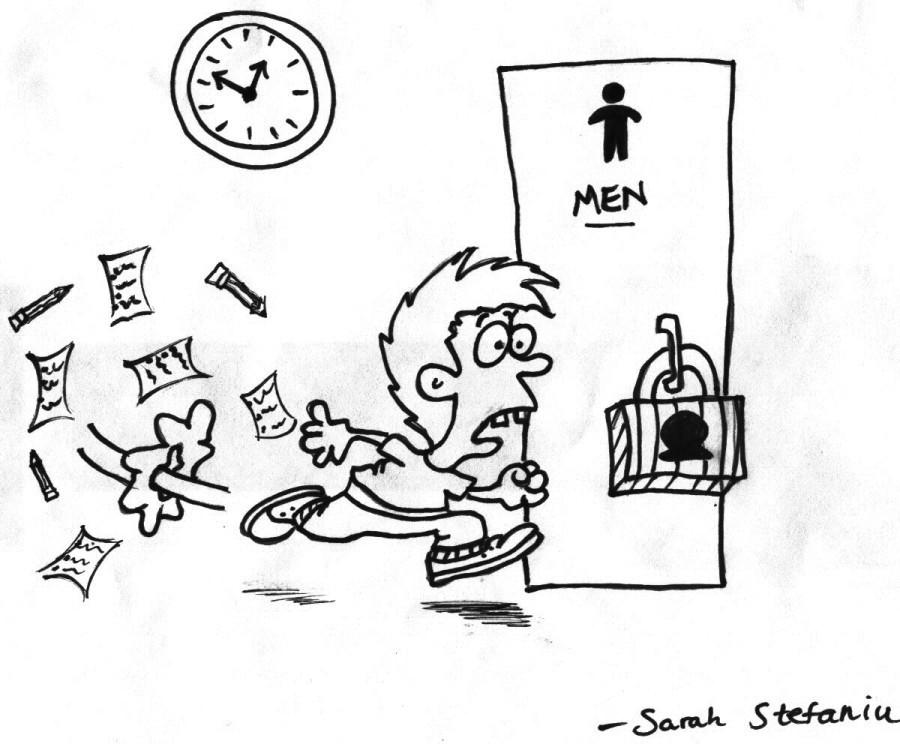The Laws of the Land: Archaic or Effective?
There are a few basic by-laws that almost every American youth learns in elementary school. These are called the “Kindergarten Commandments”: don’t eat glue, ask before going to use the bathroom, raise your hand. In their simplest forms, these rules provide the basis for what is supposedly right and wrong.
For the most part, we, as teenagers, still abide by these laws. I still try to play nicely with others, avoid glue at all costs and raise my hand in class. However, as I’ve gotten older, I’ve started to question some of theses codes of conduct, specifically raising my hand and asking permission to use the bathroom. Should I, as a responsibility juggler and self-identifying professional test-taker, have to ask permission to expel my thoughts or pee? Have I earned the right to relieve myself when necessary and exercise my freedom of speech?
I realize that one of these privileges is a bit more important than the other. I could always use the restroom during lunch and study hall. Do I really want to miss notes and projects and lessons during class? Probably not, but that’s not the question at hand. The real issue is that by having to ask permission to perform a bodily function is at best comical and at worst, dehumanizing. I understand that it’s quite rude to simply get up and leave while an educator is, well, educating. However, I can’t help but think that here I am, planning the next four years of my life, attempting to tackle the Common App, and filing for financial aid that could result in lifelong debt, while I still must raise my hand to use the bathroom It’s really quite amusing.
Raising our hands as a proposal to speak in class is just as irksome as raising our hands as a proposal to urinate, though I understand the reasoning behind it more. We raise our hands to avoid talking over each other and to give respect to the person speaking. However, this system is clearly flawed. You see, there are three types of hand-raisers. There are those that have their hand up even before the person speaking is finished and desperately clinging to his or her thought, all the while praying that whoever is talking ceases immediately. There are very few situations as frustrating as losing one’s thought because someone wouldn’t shut it. It doesn’t matter if the words coming out of this person’s mouth are golden or rusty. We just don’t want to lose the page in our book of thoughts.
The second hand-raiser is usually high on adrenaline. They are the listeners, the bulbs that burn brighter and brighter as the speaker turns them on with new ideas and concepts. These kids are so inspired that they can’t get their ideas out fast enough. I have fallen into this category more times than I can remember. The best strategy is to write everything down so when your erect arm and extended fingers are noticed, you have a collection of thoughts to dish out yourself.
The third hand-raiser is the rejected. We have all experienced such a defeat. We hope and we smile and put all our ambition into five digits flying through the air and catch nothing. We are lost in a forest of hands, each one faster than our own or closer to the teacher. We are ignored, always involuntarily, but ignored nonetheless. It is not only dehumanizing to have to compete to share our thoughts, but then to have them rejected and discarded as well.
It seems this introduction to the real world is preparing us for two circumstances: rejection or empowerment. There will be plenty of people who won’t want to hear what we have to say. There will be others who will try to get their message across by tearing ours up. Is the hand raising system trying to tell us that we should just let it be and hope for next time? Or is the lesson to find ways of getting our point across by any means, even, god forbid, by calling out? Either way, this system pushes some down to allow others to float. And yet, we keep stretching our fingers to the ceiling.
We, as adolescents, have something to say. It can range from “May I please use the bathroom” to “Atticus Finch represents all that is good and pure.” The fact that we must fight for our voices, or have to jump through hoops to use them, is mind-boggling considering that we are about to leave for college and enter “adulthood.” And yet, we have no choice in this matter. We either follow the codes programmed in us since the days of Velcro sneakers or face the consequences. Why should that be? Why isn’t there a Bill of Rights in this daily unspoken constitution?Perhaps it’s all a test. Perhaps the world is just waiting to see how high we are willing to reach.



